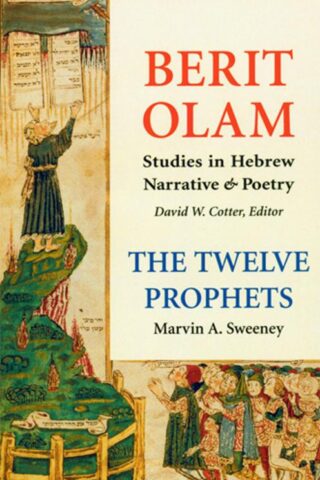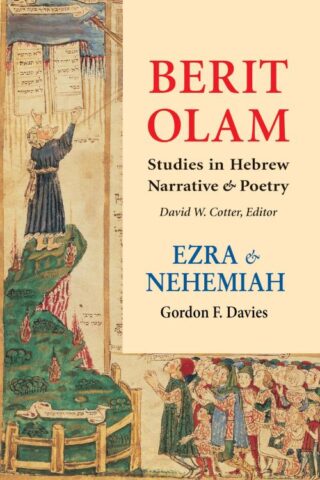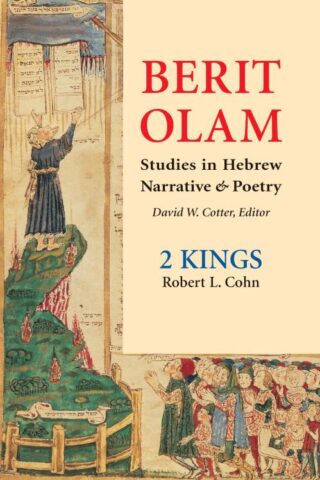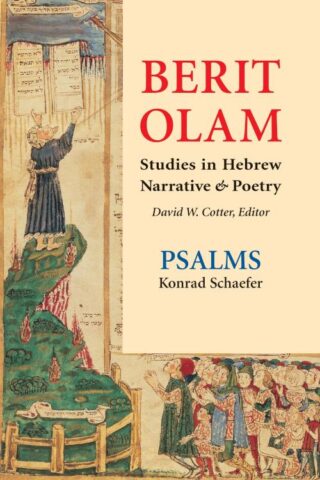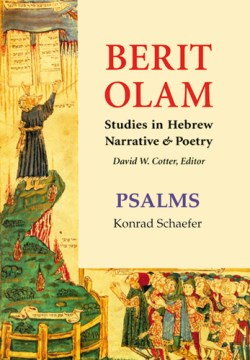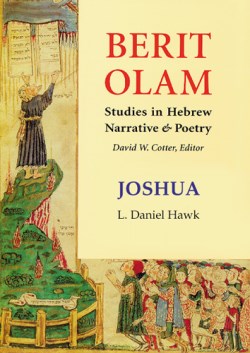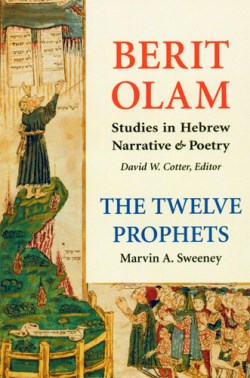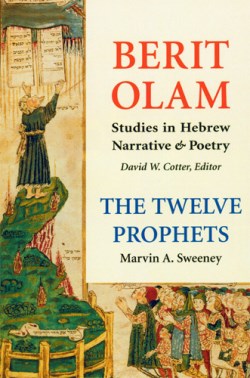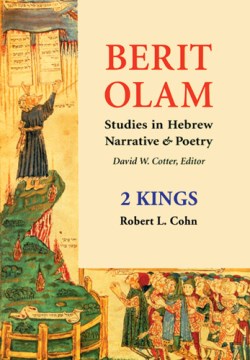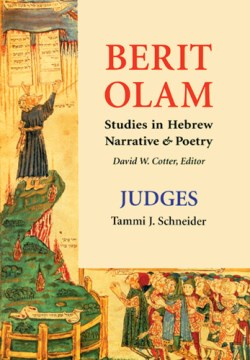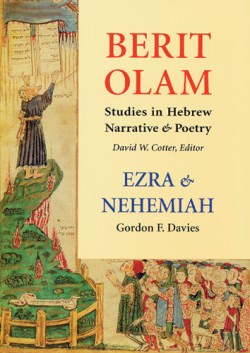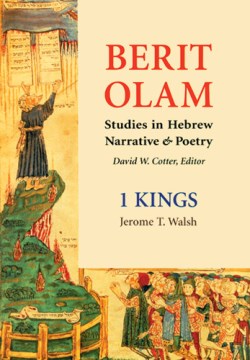David Cotter
Showing all 12 resultsSorted by latest
-
12 Prophets: Volume 1
$44.95Add to cartThere is generally no common material that binds together the works of the individual prophets that comprise the Twelve, but through Sweeney’s commentary they stand together as a single, clearly defined book among the other prophetic books of the Bible.The Book of the Twelve Prophets is a multifaceted literary composition that functions simultaneously in all Jewish and Christian versions of the Bible as a single prophetic book and as a collection of twelve individual prophetic books. Each of the twelve individual books – Hosea, Joel, Amos, Obadiah, Jonah, Micah, Nahum, Habakkuk, Zephaniah, Haggai, Zechariah, and Malachi – begins with its own narrative introduction that identifies the prophet and provides details concerning the historical setting and literary characteristics. In this manner each book is clearly distinguished from the others within the overall framework of the Twelve.By employing a combination of literary methodologies, such as reader response criticism, canonical criticism, and structural form criticism, Sweeney establishes the literary structure of the Book of the Twelve as a whole, and of each book with their respective ideological or theological perspectives.
An introductory chapter orients readers to questions posed by reading the Book of the Twelve as a coherent piece of literature and to a literary overview of the Twelve. Sweeney then treats each of the twelve individual prophetic books in the order of the Masoretic canon, providing a discussion of each one’s structure, theme, and outlook. This is followed by a detailed literary discussion of the textual units that comprise the book.
-
Ezra And Nehemiah
$29.95Add to cartEzra-Nehemiah has been neglected in biblical studies, but it is important as one of the few windows into the Persian period of Israel’s history, the setting for so much of the final shape of the Hebrew Bible. To know this period is to know what influenced these redactors. In Ezra and Nehemiah Gordon Davies provides that knowledge using rhetorical criticism, a methodology that reveals the full range and progress of the book’s ideas without hiding its rough seams and untidy edges.
The purpose of rhetorical criticism is to explain not the source but the power of the text as a unitary message. This approach does not look at plot development, characterization, or other elements whose roughness makes Ezra-Nehemiah frustrating to read. Instead, it examines the three parts of the relationship – the strategies, the situations, and the ffects – between the speaker and the audience. Rhetorical criticism’s scrutiny of the audience in context favors the search for the ideas and structures that are indigenous to the culture of the text.
Rhetorical criticism is interested in figures of speech as means of persuasion. Therefore, to apply it to Ezra-Nehemiah, Davies concentrates on the public discourse – the orations, letters, and prayers – throughout its text. In each chapter he follows a procedure that: (1) where it is unclear, identifies the rhetorical unit in which the discourse is set; (2) identifies the audiences of the discourse and the rhetorical situation; (3) studies the arrangement of the material; (4) studies the effect on the various audiences; (5) reviews the passage as a whole and judges its success. In the conclusion, Davies explains that Ezra-Nehemiah makes theological sense on its own terms, by forming a single work in which a range of ideas is argued.
Biblical scholars as well as those interested in literary criticism, communication studies, rhetorical studies, ecclesiology, and homiletics will find Ezra and Nehemiah enlightening.
-
2 Kings : Studies In Hebrew Narrative And Poetry
$34.95Add to cartOpening with the prophet Elijah’s ascent into heaven and closing with the people of Judah’s descent to Babylonia, 2 Kings charts the story of the two Israelite kingdoms until their destruction. This commentary unfolds the literary dimensions of 2 Kings, analyzes the strategies through which its words create a world of meaning, and examines the book’s tales of prophets, political intrigue, royal apostasy, and religious reform as components of larger patterns.
2 Kings pays attention to the writers’ methods of representing human character and of twisting chronological time for literary purposes. It also shows how the contests between kings and prophets are mirrored in the competing structures of regnal synchronization and prophecy-fulfillment. Much more than a common chronicle of royal achievements and disasters, 2 Kings emerges as a powerful history that creates memories and forges identities for its Jewish readers.
2 Kings is divided into four parts including Part One “The Story of Elisha: 2 Kings 1:1-8:6”; Part Two “Revolutions in Aram, Israel, and Judah: 2 Kings 8:7-13:25”; Part Three “Turmoil and Tragedy for Israel: 2 Kings 14-17”; and Part Four “Renewal and Catastrophe for Judah: 2 Kings 18-25.”
-
Psalms : Studies In Hebrew Narrative And Poetry
$49.95Add to cartThe psalms are masterful poems that echo the tenors of community life and worship as they project the scope of the human drama from lament to praise. They chart a profound and vital relationship with God, with all the ups and downs that this relationship implies. Konrad Schaefer’s concise commentary on the psalms relates their poetic elements while respecting their historical context and traditional use in the liturgy and, more importantly, their ultimate value as a springboard to private and communal prayer.
In Psalms, Schaefer focuses on the structure of each psalm, its dramatic plot, the modes of discourse, the rhetorical features, and the effective use of imagery to portray theology and the spiritual life. Schaefer portrays each poem’s inner dynamic to acquaint readers with the poet and the community which prayed and preserved the composition, allowing the believer to transpose it in the contemporary situation.
Psalms is for those who would like to pray the psalms with more intensity of meaning; for those willing to touch the biblical world and taste of its fruit in the Word of God; and for devoted readers of the Bible to become more expert as it helps experts become more devoted.
Chapters are Introduction,” “Book One (Psalms 1-41),” “Book Two (Psalms 42-72),” “Book Three (Psalms 73-89),” “Book Four (Psalms 90-106),” and “Book Five (Psalms 107-150).”
-
Psalms : Studies In Hebrew Narrative And Poetry
$69.95Add to cartThe psalms are masterful poems that echo the tenors of community life and worship as they project the scope of the human drama from lament to praise. They chart a profound and vital relationship with God, with all the ups and downs that this relationship implies. Konrad Schaefer’s concise commentary on the psalms relates their poetic elements while respecting their historical context and traditional use in the liturgy and, more importantly, their ultimate value as a springboard to private and communal prayer.
In Psalms, Schaefer focuses on the structure of each psalm, its dramatic plot, the modes of discourse, the rhetorical features, and the effective use of imagery to portray theology and the spiritual life. Schaefer portrays each poem’s inner dynamic to acquaint readers with the poet and the community which prayed and preserved the composition, allowing the believer to transpose it in the contemporary situation.Psalms is for those who would like to pray the psalms with more intensity of meaning; for those willing to touch the biblical world and taste of its fruit in the Word of God; and for devoted readers of the Bible to become more expert as it helps experts become more devoted.
-
Joshua : Studies In Hebrew Narrative And Poetry
$64.95Add to cartWhat does Joshua hold to be the essential marks of Israelite identity? What distinguishes “Israel” from all other peoples? In tracking these themes, L. Daniel Hawk reveals in Joshua a profound struggle to define the people of the God of Israel.
Hawk shows that the themes surrounding Joshua express fundamental markers of national identity: religious practice (obedience to the commandments of Moses), ethnic separation (extermination of the peoples of Canaan), and possession of land (“the land that YHWH gives”). Through the medium of narrative, Joshua tests each of these markers and demonstrates that none clearly characterize the people of God. Instead, Joshua presents Israel as a nation fundamentally constituted by choosing: YHWH’s choosing of Israel and Israel’s choosing of YHWH.In the present day in which ideologies of religion, race, and territorial possession have given rise to countless expressions of violence, Hawk expresses the particular value of reading Joshua. The Joshua story holds a mirror up to all who regard themselves as the people of God. The reflection is both repelling and inspiring but until we confront it, what it truly means to be the chosen people of God will remain elusive.
-
12 Prophets Volume 1
$54.95Add to cartThis two-volume set is a literary commentary of the book of the Twelve Prophets. Building upon the author’s previous work on the structure and literary coherence of the book of Isaiah, it attempts to read the book of the Twelve as a distinctive literary work with it’s own structure, themes, and theological or ideological perspective. In addition, it treats each of the twelve minor prophets as a literacy entity unto itself as well as a component unit of the larger book of the Twelve. This is volume one in the set and contains the minor prophets: Hosea, Joel, Amos, Obadiah, and Jonah.
-
12 Prophets Volume 2
$69.95Add to cartThis multi-volume commentary reflects a relatively new development in biblical studies. The readings of the books of the Hebrew Bible offered here all focus on the final form of the texts, approaching them as literary works, recognizing that the craft of poetry and storytelling that the ancient Hebrew world provided can be found in them and that their truth can be better appreciated with a fuller understanding of that art. As they have for centuries, people still turn to the Hebrew Bible to hear afresh the life-giving words of God’s everlasting convenant. Berit Olam (“The Everlasting Covenant”): Studies in Hebrew Narrative & Poetry brings to all interested in the Bible, be they lay people, professional biblical scholars, students, or religious educators, the latest developments in the literary analysis of these ancient texts.
-
2 Kings : Studies In Hebrew Narrative And Poetry
$59.95Add to cartOpening with the prophet Elijah’s ascent into heaven and closing with the people of Judah’s descent to Babylonia, 2 Kings charts the story of the two Israelite kingdoms until their destruction. This commentary unfolds the literary dimensions of 2 Kings, analyzes the strategies through which its words create a world of meaning, and examines the book’s tales of prophets, political intrigue, royal apostasy, and religious reform as components of larger patterns.
2 Kings pays attention to the writers’ methods of representing human character and of twisting chronological time for literary purposes. It also shows how the contests between kings and prophets are mirrored in the competing structures of regnal synchronization and prophecy-fulfillment. Much more than a common chronicle of royal achievements and disasters, 2 Kings emerges as a powerful history that creates memories and forges identities for its Jewish readers. -
Judges : Studies In Hebrew Narrative And Poetry
$64.95Add to cartThe biblical book of Judges contains culturally familiar stories such as that of Samson and Delilah and Deborah and Baraq. But despite the popularity of these stories, other important stories in Judges such as that of Achsah, the raped pilegesh, and the final civil war are virtually unknown to the average reader.
Approaching Judges as a unified literary document, Tammi Schneider shows that the unity of the narrative reveals that when the Israelites adhere to the covenant established with their deity they prosper, but when they stray from it disaster follows. This is true not only in the Deuteronomistic refrains, as is recognized by many scholars, but in the whole book, and is reflected in Israel’s worsening situation throughout its narrative time.
Schneider also highlights the unifying themes in Judges. She emphasizes the role of gender, family relations, and theology expressed in the biblical narrative, and uses intertextuality to better understand the text of Judges and its context in the Deuteronomistic history and the Hebrew Bible.
-
Ezra And Nehemiah
$44.95Add to cartEzra-Nehemiah has been neglected in biblical studies, but it is important as one of the few windows into the Persian period of Israel’s history, the setting for so much of the final shape of the Hebrew Bible. To know this period is to know what influenced these redactors. In Ezra and Nehemiah Gordon Davies provides that knowledge using rhetorical criticism, a methodology that reveals the full range and progress of the book’s ideas without hiding its rough seams and untidy edges.
The purpose of rhetorical criticism is to explain not the source but the power of the text as a unitary message. This approach does not look at plot development, characterization, or other elements whose roughness makes Ezra-Nehemiah frustrating to read. Instead, it examines the three parts of the relationship-the strategies, the situations, and the effects-between the speaker and the audience. Rhetorical criticism’s scrutiny of the audience in context favors the search for the ideas and structures that are indigenous to the culture of the text.Rhetorical criticism is interested in figures of speech as means of persuasion. Therefore, to apply it to Ezra-Nehemiah, Davies concentrates on the public discourse-the orations, letters, and prayers-throughout its text. In each chapter he follows a procedure that: (1) where it is unclear, identifies the rhetorical unit in which the discourse is set; (2) identifies the audiences of the discourse and the rhetorical situation; (3) studies the arrangement of the material; (4) studies the effect on the various audiences; (5) reviews the passage as a whole and judges its success. In the conclusion, Davies explains that Ezra-Nehemiah makes theological sense on its own terms, by forming a single work in which a range of ideas is argued.
Biblical scholars as well as those interested in literary criticism, communication studies, rhetorical studies, ecclesiology, and homiletics will find Ezra and Nehemiah enlightening.
-
1 Kings : Studies In Hebrew Narrative And Poetry
$69.95Add to cartThe narratives of Solomon and Jeroboam, of Elijah and Ahab, have fascinated readers for millennia. They are the principal foundation of our knowledge of the history of Israel during the early years of the divided monarchy, and their reliability and verifiability as historical sources have long been the subject of intense scholarly analysis and debate. But even apart from questions of historical authenticity, they are gripping stories of richly drawn characters caught up in the complex tale of Yahweh’s dealings with Israel: Solomon the wise is the builder of Yahweh’s Temple, yet he becomes an idolater; Jeroboam is chosen by Yahweh as king, yet he worships the golden calves; Elijah is a prophet second only to Moses, yet he tries to renounce his calling; and Ahab is the worst of Israel’s kings, yet shows traces of greatness. This study explores the narrative world created by the ancient Israelite author – the people who inhabit it, the lives they live and the deeds they do, and the face of God who is revealed in their stories.

